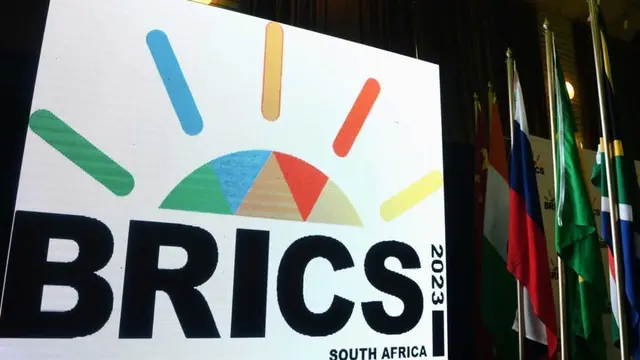*Author: Prof. Engr. Zamir Ahmed Awan, Founding Chair GSRRA, Sinologist (ex-Diplomat), Editor, Analyst, and Non-Resident Fellow of CCG (Center for China and Globalization). (E-mail: [email protected]). *
As the world prepares for the upcoming BRICS summit, to be held on 22-24 August 2023, in Johannesburg, South Africa, anticipation and speculation have reached unprecedented heights. This gathering of five major emerging economies - Brazil, Russia, India, China, and South Africa - carries with it the promise of forging a new world order, one that challenges the established norms and geopolitical dynamics. With two key agendas on the table - the de-dollarization drive and the expansion of the organization - the impact of this summit resonates far beyond the confines of its member nations. This article delves into the potential impacts and various aspects of this monumental event, shedding light on its significance for developing nations and the concerns of the US and its allies.
The De-Dollarization Drive: A Step Towards Financial Independence
The call for de-dollarization is a central theme that resonates strongly with the BRICS nations. For years, the global financial system has been dominated by the US dollar, granting the United States significant influence and control over international trade and finance. This hegemony has often led to accusations of economic coercion and manipulation. The BRICS nations, victims of these dynamics, are advocating for an alternative system that promotes greater financial sovereignty and resilience. It will end the Dollar domination and American supremacy.
De-dollarization is not merely a symbolic gesture; it represents a tangible step towards rebalancing the international financial architecture. By promoting the use of their national currencies in trade and investment, BRICS nations aim to reduce their vulnerability to sudden shifts in the value of the dollar. This move can insulate their economies from external shocks and grant them greater agency in global economic affairs.
Although such feelings were existing for since long, and few individual leaders, nations, or countries, proposed to find alternatives to Dollars,, they were suppressed by the mighty US. However, BRICS has provided a strong platform, where many victim nations gathered and jointly get rid of dollars domination. BRICS has the potential to realize this since long desired demand.
Expansion of BRICS: A Widening Sphere of Influence
The second key agenda of the summit revolves around the expansion of the BRICS organization. Originally established as an acronym to represent the collective strength of its member nations, BRICS has grown to become a platform for cooperation and collaboration in various sectors. As it seeks to broaden its membership, BRICS opens the door for other emerging economies to collectively address common challenges and reshape the global order.
The expansion carries both opportunities and challenges. On one hand, new members could bring fresh perspectives and resources to the table, strengthening the organization's influence. On the other hand, managing the diverse interests of an enlarged BRICS could prove complex, requiring careful navigation and consensus-building. There are several countries that have already applied formally to join the organization, but, many more have expressed interest. Once the doors are opened, it seems much many more will join it soon.
Impact on Developing Nations: A Glimmer of Hope
For developing nations, the BRICS summit represents a beacon of hope and solidarity. Historically, they have often found themselves on the receiving end of the power plays of developed nations. The BRICS alliance offers an alternative avenue for collaboration, one that respects their sovereignty and values their contributions. By collectively challenging the established norms, BRICS nations are sending a powerful message - that the global stage can be more inclusive and equitable.
Moreover, the agenda of de-dollarization strikes a chord with developing nations burdened by debt and economic vulnerabilities. By promoting a multipolar financial system, BRICS offers these nations an opportunity to break free from the shackles of traditional financial dominance, potentially paving the way for more sustainable development.
Concerns of the US and Its Allies: Navigating Uncharted Waters
While the BRICS summit carries promises of positive change, it also raises concerns among the United States and its allies. The potential shift away from the dollar-centric global financial system challenges the existing balance of power. The US, accustomed to exerting significant influence through its control over international finance, is understandably apprehensive about losing its privileged position.
To mitigate the potential fallout, the US and its allies are taking preventive measures. Diplomatic efforts to foster closer ties with BRICS nations, economic incentives to maintain their allegiance, and attempts to counter the narratives of the summit are all part of their strategy.
Indian unpredicted role
While many nations are expecting a lot from the upcoming BRICS Summit 2023, especially in terms of de-dollarization and expansion of the organization. But India has been creating illusions. It has not specifically supported the de-dollarization, not agreeing to accept all countries to join. The specific resistance is observed in the case of Iran's joining BRICS. It seems, India is a strategic partner of the US, a Major defense partner, and eager to join NATO, is protecting American interests. By creating hurdles in de-dollarization, and entering anti-American nations into BRICS, it is obliging America at the cost of the entire world. India may get more concessions, discounts, and benefits from America, but, should not sacrifice the interest of the rest of the world.
(ASIA PACIFIC DAILY)
 简体中文
简体中文

